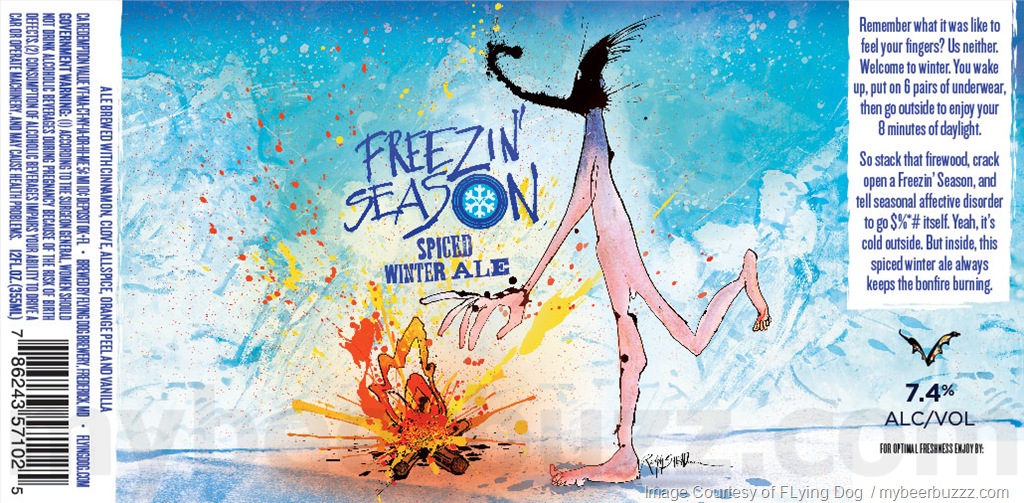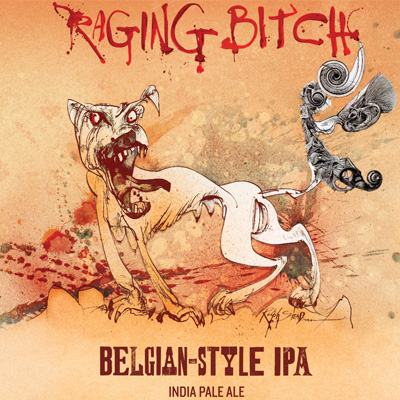
Flying Dog Brewery is proving itself once again as the brewery of free speech. Flying Dog is suing the North Carolina alcohol board for rejecting this year’s seasonal winter beer. The board decided the Maryland brewery’s “Freezin’ Season” Winter Ale was in “bad taste” and will not be sold throughout the state.
The art for “Freezin’ Season” is a painting by world-renowned artist Ralph Steadman. It features a stylized person standing naked by a campfire. The North Carolina Alcohol Board rejected the label under their state laws forbidding marketing that is “undignified, immodest, or in bad taste.” In bad taste was specifically highlighted in the rejection of the label.
After being denied, Flying Dog decided to head to court. They were scheduled to appear in court yesterday for a preliminary injunction that would allow them to sell their beer while the case is resolved.
The brewery has a long history of fighting for free speech. In 1995, according to Flying Dog CEO Jim Caruso, they faced their “run-in with the thought police.” The Colorado Liquor Board rejected their beer for including “Good Beer, No Shit” on the label. For a limited time, they changed the phrase to “Good Beer, No Censorship.” Flying Dog won the case and was later challenged in 2007 for the dog-themed Hefeweizen “In Heat Wheat” in Arkansas and again from 2009–2015 for the Belgian-style IPA “Raging Bitch” in Michigan.

Flying Dog is not the only brewery that has faced censorship at the state level over its labels. North Carolina has also denied Wasatch Brewery’s “Polygamy Porter” and Alabama has banned Founders Brewing Company’s “Dirty Bastard.”
What all these cases have in common is that they offended the alcohol boards. We see the personal and inconsistent opinions of a few infringing on First Amendment rights in the marketplace. In a statement, Caruso remarked the case was about,
defending the First Amendment against petty bureaucrats who want to censor whatever they personally dislike.
Does anyone really want to live in a country where government bureaucrats can censor material based on whim and personal preference? Books? Music lyrics? Videos streamed in the privacy of your own home? News stories?
Past decisions don’t show a lot of support for the alcohol boards. If something is in bad taste or even offensive, that doesn’t make it obscene and illegal. Looking at the supreme court case of Matal v. Tam, it seems likely the federal government will uphold First Amendment rights in this case.
In the Tam case, in which we joined an amicus brief, a band named The Slants was denied a trademark due to the Lanham Act, which prohibited registering trademarks that may “disparage … persons, living or dead, institutions, beliefs, or national symbols.” From the band’s perspective, they were affirming their racial identity and reclaiming a racist term. The band won their case, and in its decision, the Supreme Court stated, “With few narrow exceptions, a fundamental principle of the First Amendment is that the government may not punish or suppress speech based on disapproval of the ideas or perspectives the speech conveys.”
It’s important to acknowledge bans also attack the financial stability of the companies. In a 2017 interview, Caruso said that in 1995 when Colorado challenged Flying Dog, the loss of product could have put them out of business if they didn’t have deep pockets. In their current case, missing a season on the display shelf could lead to not being reinstated there when their next seasonal beer is released. This financial pressure creates an environment of self-censorship if your business can be financially rocked by a board or committee that finds your product offensive or in poor taste. That is not for them to decide.
Cases dealing with beer labels, comic books, and even cheerleaders on social media are criticized for not being important. However, it is these cases that slowly erode our rights if we let them. Raise a beer to Flying Dog for their continued fight for First Amendment rights!